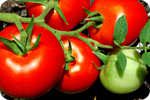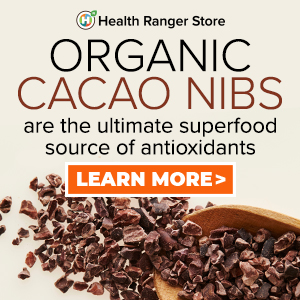
Eat tomatoes, avoid a stroke?
Thursday, October 11, 2012 by: Katie Brind''Amour
Tags: tomatoes, stroke, prevention
- The hidden war above: Chemtrails, HAARP and the battle for planetary control
- CLOT SHOT PLANDEMIC UNFOLDING: Fibrous, rubbery clots caused by covid injections have prion-like seeding activity
- Widespread social and economic unrest: Steve Quayle issues urgent financial warning of imminent asset collapse in new interview with Mike Adams
- DEATH by VACCINE or face PRISON time: Canadian Freedom Convoy leaders CONVICTED for protesting forced vaccination during the Covid Plandemic
- Aerosolized bioweapons? Strange “diploid biomasses” falling out of the sky in Florida captured under the microscope
- Hidden toll: Federal secrecy shields wind industry's eagle deaths to protect land-hungry turbines that yield minimal power
- 7 Must-have multi-functional survival tools for every prepper
- Analysis: The coming economic collapse, a mass uprising and Trump's three secret weapons to halt the growing revolt
- Florida Senate passes bill banning geoengineering and weather modification and Governor DeSantis has indicated it will become law
- FBI imposed gag order on agents to silence Hunter Biden laptop truth before 2020 election, new chat logs reveal
- Idaho Gov. Brad Little vetoes Medical Freedom Act
- Defunding DEADLY mRNA jabs: Government funding for mRNA technology being scrutinized and sidelined until proven "safe and effective" for real
- How to detox from metals falling out of the sky
- “Project Aldrin”: Senate probes Meta's alleged censorship dealings with China
- Kiss Your Genetic Privacy Good-Bye! 23andMe Gets Green Light to Sell Your Intimate Genetic Details to Anyone They Want
- Global pedophile ring “Kidflix” shut down in landmark Europol operation
- Mike Adams releases country western hit single: Goin’ Back in Time is Comin’ Home
- Mark Zuckerberg's Meta allegedly trained AI on millions of stolen books from “shadow libraries”
- Newly released JFK files reveal Pentagon's role in creating Lyme disease and covid in the same lab
- European Court of Justice: Healthcare professionals who promoted or administered COVID-19 vaccines are CRIMINALLY LIABLE for any harm caused
- Aerosolized bioweapons? Strange “diploid biomasses” falling out of the sky in Florida captured under the microscope
- Oncologist warns of ‘terrifyingly aggressive’ cancers in children, linked to immune suppression from COVID vaccines
- Britain’s descent into police state censorship: Parents raided for questioning their daughter’s school system online
- Analysis: The coming economic collapse, a mass uprising and Trump's three secret weapons to halt the growing revolt
- Utah governor allows ban on LGBT pride flags in public buildings and schools, will take effect without his signature
- Kiss Your Genetic Privacy Good-Bye! 23andMe Gets Green Light to Sell Your Intimate Genetic Details to Anyone They Want
- FBI imposed gag order on agents to silence Hunter Biden laptop truth before 2020 election, new chat logs reveal
- The Health Ranger releases “Vaccine Zombie” song and music video, using AI-animated zombies for the music video
- DARPA: The shadowy innovator behind the world’s most advanced military technologies
- Mike Adams releases country western hit single: Goin’ Back in Time is Comin’ Home
- “Project Aldrin”: Senate probes Meta's alleged censorship dealings with China
- When antibiotics are unavailable, natural ANTIMICROBIAL compounds become essential first line defenses against infection
- AI-powered forecasting model proves more accurate than traditional systems at predicting the weather
- German researchers find link between mRNA vaccines and GENETIC CHANGES that precede CANCER and AUTOIMMUNE DISORDERS
- Dr. Mary Talley Bowden drops bombshells about children being permanently damaged by mRNA jabs during Tucker Carlson interview
- Ancient kitchen secrets REVEALED: How garlic, ginger and green onions fight cancer and heart disease
- Newly released JFK files reveal Pentagon's role in creating Lyme disease and covid in the same lab
- California's social media censorship law struck down: A victory for free speech or a threat to online safety?
- The Health Ranger releases “Vaccine Zombie” song and music video, using AI-animated zombies for the music video
- Dr. Mike Yeadon releases 15-minute testimony - WATCH - about genocidal intent of COVID “vaccines”
- EPA advisor admits the agency is funneling billions to climate groups ahead of Trump’s return to White House
- Rep. Nancy Mace introduces bill to ban biological males from female facilities on federal property
- Florida takes a stand: DeSantis proposes permanent ban on mRNA vaccine mandates
- Sugarcane extract superior to cholesterol-lowering drugs?
- Survival 101: Effective EMF blocking techniques
- Mike Adams releases country western hit single: Goin’ Back in Time is Comin’ Home
- OpenAI whistleblower who dissented against how the company trained ChatGPT found dead
- Attorney and TikTok influencer explains how he was offered hundreds of dollars to make false claims about Trump, Republicans
- CONSERVATIVES SOUND THE ALARM: Big Pharma and the Left trying to force $32 billion money grab from America’s seniors into year-end spending deal
- Pilots report mysterious lights 'moving at extreme speeds' across Oregon skies
- Trump expected to choose Kelly Loeffler as his agriculture secretary even though she was caught INSIDER TRADING during COVID
- Marketing director responsible for WOKE Jaguar rebrand is also an LGBT activist who supports Black Lives Matter
- Unpacking the Lies That We’ve Been Fed – new song and music video released by Mike Adams, the Health Ranger
- Poll: Majority of Ukrainians want peace negotiations to end war with Russia
- Red Cross issues warning to stop blood plasma donations from vaccinated people
- Scientists confirm: GENIUS brain function can be spontaneously unleashed in humans without any apparent cause
- EPA advisor admits the agency is funneling billions to climate groups ahead of Trump’s return to White House
- HYSSOP: What research reveals about the health benefits of this ancient holy herb
- Two containers with completed ballots fall out of truck in Florida
- Fully vaccinated about to see “tsunami” of illness and death, warns virologist
- Global leaders unite to clamp down on “misinformation” with UN-backed Cascais Declaration
- BREAKING: 2025 NDAA authorizes mandatory military draft of WOMEN across America… as Pentagon pursues global NUCLEAR war with both Russia and China at the same time
- Newly released JFK files reveal Pentagon's role in creating Lyme disease and covid in the same lab
- Michael Yon warns of a ZIONIST TAKEOVER in Trump’s second administration
- BOMBSHELL: DNA testing kits are a SCAM to develop ethnic-specific bioweapons
- Ozempic and Wegovy weight loss drugs are injectable LIZARD VENOM PEPTIDES that may unleash a devastating wave of organ failure… side effects align with symptoms of SNAKE BITES
- The Health Ranger releases “Vaccine Zombie” song and music video, using AI-animated zombies for the music video
- Israeli soldiers accused of even more torture and abuse in the West Bank
- These 13 countries just signed an agreement to engineer a global FAMINE by destroying food supply
- NASA admits that climate change occurs because of changes in Earth’s solar orbit, and NOT because of SUVs and fossil fuels
- RFK Jr. clears key hurdle: Sen. Susan Collins backs controversial HHS nominee, signaling a new era for health policy
- Sermon 30: How Jesus reveals Caesar’s FAKE CURRENCY and FALSE AUTHORITY
Fruit and vegetable consumption and carotenoid concentration in the blood has gradually been gaining a positive reputation in maintaining cardiovascular health. Lycopene (commonly found in tomatoes and watermelon) and beta-carotene (which can be found in carrots, pumpkin, and spinach) are two of the chief carotenoids believed to help in the prevention of stroke.
The magic of carotenoids
Carotenoids have numerous preventive effects. They have been renowned for their ability to help prevent lung and prostate cancer, and their antioxidant properties may be responsible for preventing the build-up of plaque in the arteries, which is a crucial contributor to heart disease and stroke.These benefits may arise as much from the general diet and lifestyle that accompany the consumption of large amounts of carotenoid-containing vegetables. Because of this, scientists are unable to draw a causal connection between carotenoids and stroke. The research is promising; however, and researchers and public health advocates alike are eager to point to results of studies like this to encourage a well-rounded, veggie-heavy diet.
The highest concentrations of carotenoids can be found in fruits and vegetables with red, orange, and yellow skins or flesh. Heavy hitters include tomato paste, sweet potatoes, carrot juice, papayas, citrus fruits, and leafy greens. Aim for at least five servings of fruits and vegetables each day, and eat carotenoid-containing foods with a source of fat to help your body absorb the nutrients properly.
Supplements may also be effective, although fewer studies have demonstrated a strong connection between carotenoid pills and improved cardiovascular health. Most physicians recognize the value of these amazing antioxidants but also recommend a varied, nutritious diet and regular physical activity as the best way to promote cardiovascular health.
In addition, although the study did not extend to women or young individuals, researchers expect that a diet high in carotenoids and fruits and vegetables will hold similar preventive effects for the general population.
Sources for this article include:
http://www.ncbi.nlm.nih.gov/pubmed/22494809
http://www.healthline.com
http://lpi.oregonstate.edu
About the author:
Katie BrindAmour is a Certified Health Education Specialist and passionate health and wellness freelance writer. She enjoys cooking, yoga, gardening, searching for the perfect wine and chocolate combination, and spending time with friends. She has a Masters in Biology and is currently pursuing her PhD in Health Services Management and Policy. She also enjoys blogging for Women's Healthcare Topics and Healthline Networks.
Tomatoes at FETCH.news
Get independent news alerts on natural cures, food lab tests, cannabis medicine, science, robotics, drones, privacy and more.
Take Action: Support Natural News by linking to this article from your website
Permalink to this article:
Embed article link: (copy HTML code below):
Reprinting this article:
Non-commercial use OK, cite NaturalNews.com with clickable link.
Follow Natural News on Facebook, Twitter, Google Plus, and Pinterest
Science News & Studies
Medicine News and Information
Food News & Studies
Health News & Studies
Herbs News & Information
Pollution News & Studies
Cancer News & Studies
Climate News & Studies
Survival News & Information
Gear News & Information
News covering technology, stocks, hackers, and more



"Big Tech and mainstream media are constantly trying to silence the independent voices that dare to bring you the truth about toxic food ingredients, dangerous medications and the failed, fraudulent science of the profit-driven medical establishment.
Email is one of the best ways to make sure you stay informed, without the censorship of the tech giants (Google, Apple, Facebook, Twitter, YouTube, etc.). Stay informed and you'll even likely learn information that may help save your own life."
–The Health Ranger, Mike Adams












































